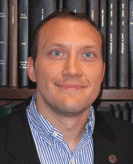By Jayna Miller
 Dr. George Bollas, an assistant professor in the Department of Chemical and Biomolecular Engineering, is the recipient of a prestigious ACS Petroleum Research Fund Doctoral New Investigator Award. The ACS PRF programs support innovative research in the petroleum field and promote the development of promising engineers and scientists. The award program provides career opportunities to young faculty and their undergraduate and graduate students by supporting advanced scientific research. The goals of the American Chemical Society Petroleum Research Fund are to support fundamental research in the petroleum field and develop the next generation of engineers and scientists through the support of advanced scientific education.
Dr. George Bollas, an assistant professor in the Department of Chemical and Biomolecular Engineering, is the recipient of a prestigious ACS Petroleum Research Fund Doctoral New Investigator Award. The ACS PRF programs support innovative research in the petroleum field and promote the development of promising engineers and scientists. The award program provides career opportunities to young faculty and their undergraduate and graduate students by supporting advanced scientific research. The goals of the American Chemical Society Petroleum Research Fund are to support fundamental research in the petroleum field and develop the next generation of engineers and scientists through the support of advanced scientific education.
Dr. Bollas’ research project will explore aspects of Fischer-Tropsch Synthesis selectivity. The Fischer-Tropsch process is a collection of chemical reactions that provide a means of producing transportation fuels from carbon monoxide and hydrogen, a combination referred to as synthesis gas. This reaction also produces excess hydrocarbon products in addition to materials for fuel, so there remains a need to make this process more selective.
Through Dr. Bollas’ research, it may be possible to significantly improve the selectivity of this process to make the synthesis of fuel through Fisher-Tropsch more efficient and economical. Dr. Bollas and his research group plan to examine novel catalyst synthesis methods that enhance the selectivity of Fischer-Tropsch Synthesis (FTS) towards intermediate-chain length hydrocarbons, particularly synthetic gasoline.
The benefits of making Fischer-Tropsch a more efficient and less centralized process are energy independence and security. In addition, the vast unexploited resources of natural gas found recently in the US make natural gas a major source for energy and fuels production. Dr. Bollas’ new experimental work will provide the capability to expand research exploring alternative fuels and efficient processes at the CBE Department and in the Center for Clean Energy Engineering.
Dr. Bollas is a process design expert and winner of the prestigious NSF CAREER Award and the ACS PRF DNI Award. His research focuses on biomass pyrolysis, coal and biomass to liquids, Fischer-Tropsch synthesis, chemical-looping combustion, and waste to energy processes.



 Effective July 1, 2013,
Effective July 1, 2013, 

 Dr. Peter Karp, Director of the Bioinformatics Research Group at SRI International, will be visiting the CMBE Department at UConn as a Guest Professor this summer. Hosted by Professor Ranjan Srivastava, Dr. Karp will engage the UConn community through a series of seminars on Computational Biology and Bioinformatics, as well as carry out research and develop collaborations with faculty at Storrs and the Health Center.
Dr. Peter Karp, Director of the Bioinformatics Research Group at SRI International, will be visiting the CMBE Department at UConn as a Guest Professor this summer. Hosted by Professor Ranjan Srivastava, Dr. Karp will engage the UConn community through a series of seminars on Computational Biology and Bioinformatics, as well as carry out research and develop collaborations with faculty at Storrs and the Health Center. The department would like to extend its congratulations to Leslie Shor for her recognition as a finalist in the 8th Annual Women of Innovation Awards Dinner hosted by the Connecticut Technology Council.
The department would like to extend its congratulations to Leslie Shor for her recognition as a finalist in the 8th Annual Women of Innovation Awards Dinner hosted by the Connecticut Technology Council.